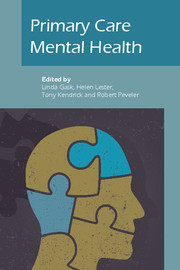Book contents
- Frontmatter
- Contents
- List of figures, tables and boxes
- List of contributors
- Preface
- Part I Conceptual basis and overarching themes
- Part II Clinical issues
- Part III Policy and practice
- Part IV Reflective practice
- 29 Teaching and learning about mental health
- 30 Undertaking mental health research in primary care
- 31 Individual treatment decisions: guidelines and clinical judgement
- 32 Self and others: the mental healthcare of the practitioner
- Epilogue: Racing pigeons and rolling rocks: reflections on complex problems in primary care
- Index
31 - Individual treatment decisions: guidelines and clinical judgement
from Part IV - Reflective practice
Published online by Cambridge University Press: 02 January 2018
- Frontmatter
- Contents
- List of figures, tables and boxes
- List of contributors
- Preface
- Part I Conceptual basis and overarching themes
- Part II Clinical issues
- Part III Policy and practice
- Part IV Reflective practice
- 29 Teaching and learning about mental health
- 30 Undertaking mental health research in primary care
- 31 Individual treatment decisions: guidelines and clinical judgement
- 32 Self and others: the mental healthcare of the practitioner
- Epilogue: Racing pigeons and rolling rocks: reflections on complex problems in primary care
- Index
Summary
A case of major depression?
A case of depression, based on a real-life patient from my practice, is first presented, in order to highlight some of the issues involved in deciding whether or not to offer antidepressant treatment in the context of guideline recommendations and clinical judgement.
Case 1. A case of major depressive disorder?
John, 68 years old, comes to the surgery in response to a letter from his general practitioner (GP) advising him he is overdue for a 3-monthly review of his repeat prescriptions of ramipril and furosemide for heart failure, and finasteride for benign prostatic hypertrophy. On arrival, he apologises because he thinks he's wasting the GP's time, as nothing much has changed since he was last seen, 5 months previously. However, he does not seem his usual cheerful self, and when the GP reflects on that to him he admits to having felt tired for some months, all day long, in spite of sleeping more than usual. When the GP asks him two quick screening questions for low mood, he does not admit to being depressed as such, but does admit that there really is no enjoyment at all in his life these days. The GP then asks him what is going on in his life to make him feel this way. He has been increasingly lonely since his wife died 2 years ago. He goes to the pub every night for two or three pints of beer, but hardly knows anyone there any more. He has stopped following the horse racing on television as he cannot concentrate any more. He is becoming forgetful and thinks he is getting senile. On further enquiry he agrees he has been eating less and has lost some weight, and when pressed he admits he feels he has nothing much to live for, although suicide is not an option for him.
The GP asks him if he would mind completing a questionnaire about how he is feeling and shows him how to complete the Patient Health Questionnaire (PHQ–9) for depression (Spitzer et al, 1999). He completes the form while the GP enters his history on the computer, and his score is 9 (indicating mild depression).
How does the GP decide whether or not to offer John active treatment for depression, specifically antidepressants?
- Type
- Chapter
- Information
- Primary Care Mental Health , pp. 453 - 460Publisher: Royal College of PsychiatristsPrint publication year: 2009

